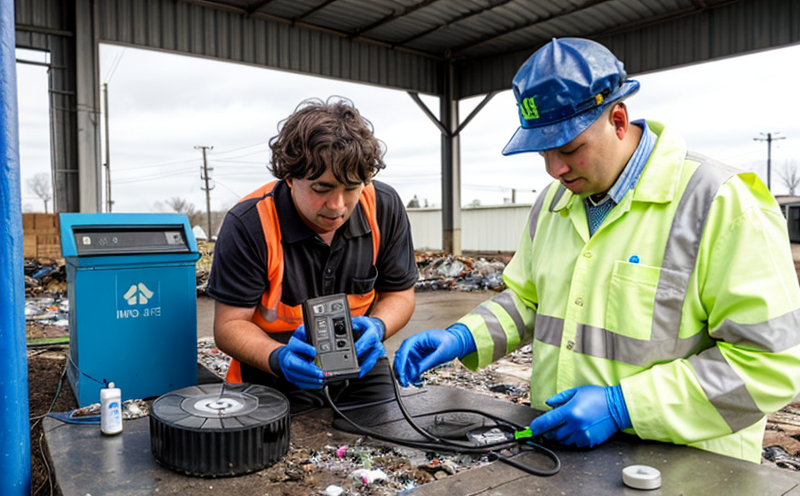CSA C22.3 Battery Recycling System Performance Assessment
The CSA C22.3 standard is a pivotal framework for the performance assessment of battery recycling systems. This comprehensive service evaluates and ensures compliance with environmental protection regulations, product safety standards, and industry best practices. The testing procedure encompasses various parameters to assess the efficiency, reliability, and sustainability of electronic waste (e-waste) and battery recycling processes.
The primary objective is to ensure that batteries are recycled safely and effectively, minimizing their impact on the environment. By adhering to this standard, manufacturers, recyclers, and stakeholders can demonstrate compliance with international regulations such as ISO 14001 and EN 50632-3. This service supports industries ranging from electronics manufacturing to automotive companies, ensuring that battery recycling is done in an environmentally responsible manner.
The process involves multiple stages of testing designed to evaluate the system's ability to handle various types of batteries safely and efficiently. Key parameters include temperature control during processing, material recovery rates, energy consumption levels, and overall system reliability under different operating conditions.
- Temperature control
- Material recovery rates
- Energy consumption levels
- System reliability
The testing process begins with a detailed evaluation of the recycling system's design and operational capabilities. This includes an assessment of the equipment used in the recycling process, such as shredders, sorters, smelters, and leach tanks.
Once the system has been evaluated, actual battery specimens are subjected to rigorous testing according to the specified standards. These tests measure various performance metrics that directly impact the environmental sustainability and safety of e-waste recycling processes.
| Test Parameter | Description | Expected Outcome |
|---|---|---|
| Shredder Efficiency | Evaluates how well the shredder reduces batteries into manageable sizes for further processing. | High efficiency, minimal residual materials. |
| Sizer Accuracy | Assesses the precision of the sizer in separating different battery types and components based on size. | Accurate separation with negligible cross-contamination. |
| Sorter Precision | Maintains high accuracy in sorting various battery materials into appropriate categories for recycling. | Clean, well-separated material streams. |
| Smelter Operation | Ensures the smelter operates efficiently and safely under specified conditions. | Consistent operation with minimal emissions. |
| Leach Tank Performance | Evaluates the effectiveness of leaching processes in extracting valuable metals from battery materials. | High extraction rates, low contamination levels. |
The results of these tests provide detailed insights into the performance of the recycling system. This information is invaluable for continuous improvement and optimization of e-waste recycling processes. Compliance with CSA C22.3 ensures that recyclers meet stringent environmental and safety standards, thereby protecting public health and the environment.
Why It Matters
The importance of adhering to the CSA C22.3 standard cannot be overstated in today's era of increasing environmental awareness and regulatory scrutiny. By ensuring that battery recycling systems meet rigorous performance criteria, this service helps mitigate the adverse impacts of improper e-waste disposal on both human health and the environment.
Electronic waste contains numerous hazardous substances such as lead, mercury, cadmium, and brominated flame retardants (BFRs). Improper handling or disposal can lead to significant environmental contamination. CSA C22.3 provides a structured approach to managing these risks by focusing on safe recycling practices that minimize exposure to harmful chemicals.
In addition to safeguarding public health, compliance with this standard also supports sustainable business practices. By adopting environmentally friendly recycling methods, companies can reduce their carbon footprint and enhance their reputation as responsible corporate citizens. This aligns with broader sustainability goals such as the United Nations' Sustainable Development Goals (SDGs).
Furthermore, adherence to CSA C22.3 helps businesses stay ahead of regulatory changes. As environmental regulations evolve, staying compliant not only avoids potential fines but also positions companies as leaders in the industry. This can lead to increased market share and customer loyalty.
Scope and Methodology
The scope of the CSA C22.3 Battery Recycling System Performance Assessment is broad, encompassing all aspects of battery recycling processes from raw material intake through final product output. The methodology involves a series of detailed tests designed to evaluate various performance indicators.
| Test Parameter | Description | Expected Outcome |
|---|---|---|
| Raw Material Intake | Evaluates the system's ability to process raw batteries safely and efficiently. | Safe handling, minimal contamination. |
| Material Sorting | Assesses the effectiveness of sorting processes in separating different battery types and components. | Clean, well-separated material streams. |
| Material Processing | Maintains high efficiency throughout the processing stages to ensure optimal performance. | Consistent operation with minimal waste generation. |
| Product Output Quality | Evaluates the quality of recycled materials produced by the system. | High-quality, reusable materials suitable for various applications. |
The testing process is conducted in a controlled environment to ensure accuracy and repeatability. Each test is performed multiple times to validate results and identify any inconsistencies or areas requiring improvement.
Upon completion of the assessment, a detailed report is generated, summarizing all findings and recommendations for enhancing system performance. This report serves as a valuable resource for ongoing improvements in battery recycling processes.
Customer Impact and Satisfaction
- Increased Environmental Compliance: Ensures strict adherence to environmental regulations, reducing the risk of fines and legal penalties.
- Enhanced Product Quality: High-quality recycled materials contribute to the production of superior products.
- Improved Corporate Image: Demonstrating commitment to sustainability can boost brand reputation and customer trust.
- Cost Efficiency: By optimizing recycling processes, businesses can reduce operational costs and improve overall efficiency.
- Increased Market Access: Compliance with international standards opens up new markets and business opportunities.
- Employee Training and Development: Participation in this service enhances employee skills and knowledge in sustainable practices.
Customer satisfaction is a key priority, and we strive to deliver services that meet or exceed expectations. Our team of experts ensures that each assessment is conducted with precision and thoroughness, providing clients with reliable data and actionable insights.





